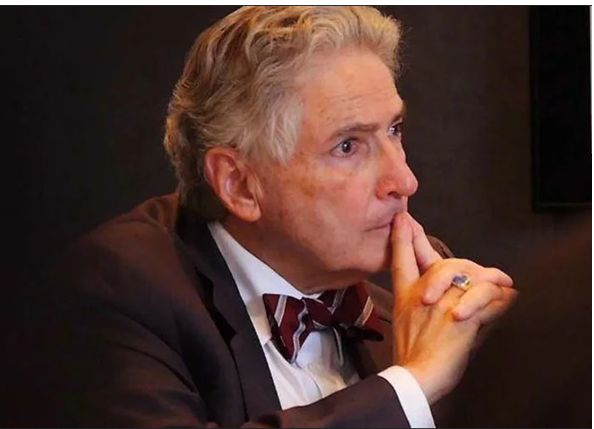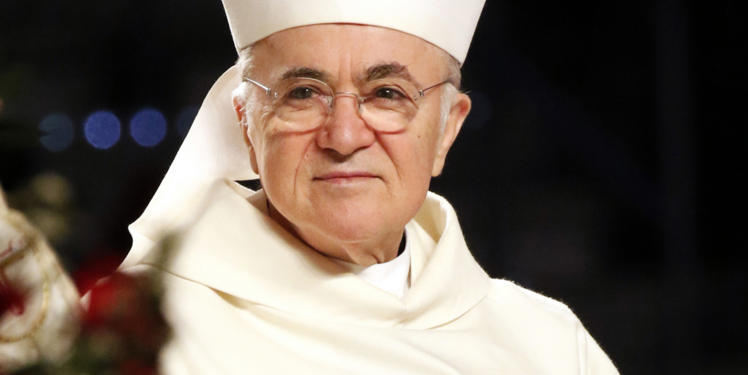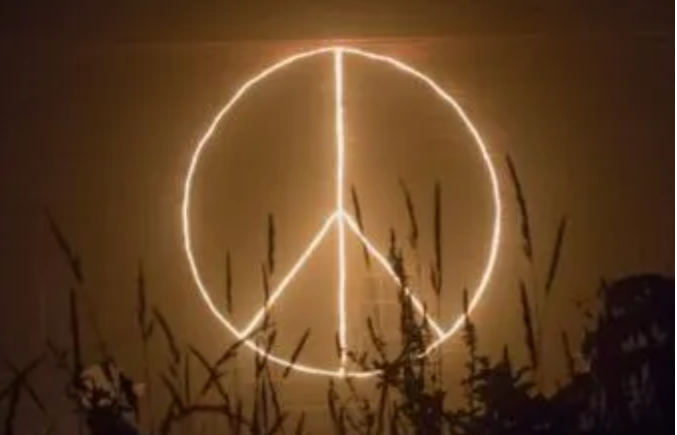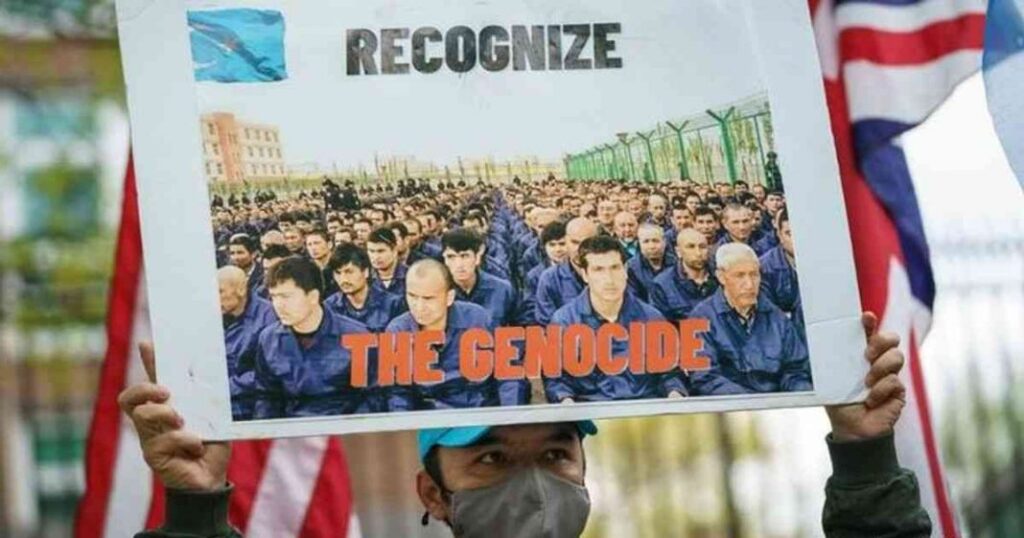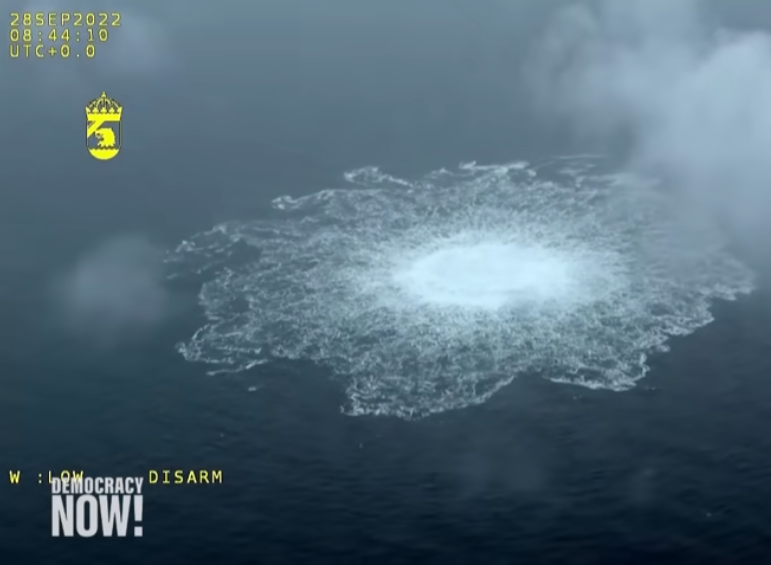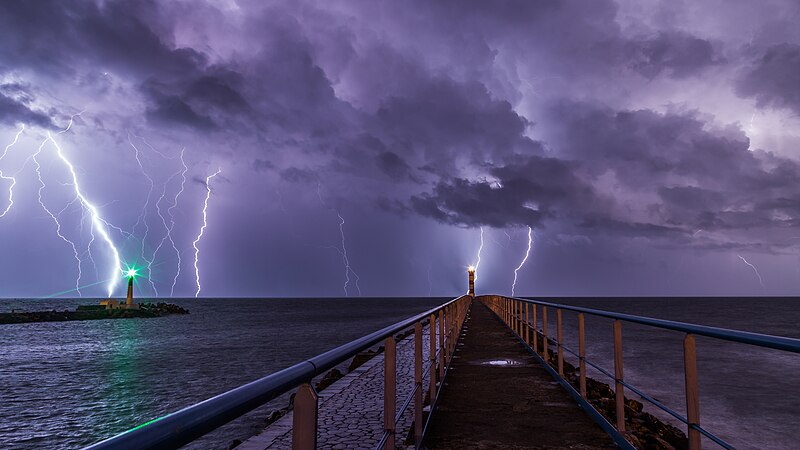UN Security Council Fails the World
By Alfred de Zayas | After the thorough, coherent and credible investigation conducted by Seymour Hersh[1] of the sabotage of Nord-Stream, any tribunal under the rule of law would commence an investigation of the terroristic bombing. Indeed, in the United States any grand jury would find that the evidence already in the public domain suffices to indict the suspect for the crime and open formal criminal proceedings, a fortiori in the absence of any credible evidence to the contrary.
The investigations conducted by Seymour Hersh constitute a solid basis to justify the establishment of an independent international investigation. Such an investigation would require the consent of those countries whose territorial sovereignty extends over the area where the explosions took place, namely Sweden and Denmark.
Sweden’s obligations vis-à-vis the world
Sweden has already carried out an investigation and should have voluntarily shared the results with the United Nations and all interested parties. Sweden’s silence speaks volumes, because if the Swedish investigation had established Russian or Belorussian responsibility, there is no doubt that Sweden would have made it public. Sweden’s silence can only be interpreted as a cover-up, because the feared consequences of revealing US violations of Swedish and Danish sovereignty, a breach of the peace, a colossal violation of international law and the laws of war. Such a revelation could have exploded NATO in the same manner as the US exploded the pipelines.
If Sweden continues to stonewall and refuses to share the results of the investigation with Germany, Russia and the world, the international community must demand it pursuant to article 19 of the International Covenant on Civil and Political Rights, which stipulates that all persons have the right to access information, the right to truth, the right to seek and impart information of all kinds, especially when the information being withheld concerns criminal acts such as terrorism.
It was the responsibility of the Security Council to have demanded from Sweden all the information in its possession, and if the information were found to be inconclusive, the Security Council should have motu proprio established an International Commission of Inquiry (COI), because such a terrorist attack on a civilian infrastructure constituted a breach of international peace and security for purposes of article 39 of the UN Charter. The world has a right to know exactly what happened.
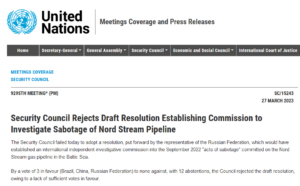 Only 3 out of 10+5 UN-Security Council members voted for UN-Inquiry-Commissionzur NS-Sabotage; Source: UN – Here
Only 3 out of 10+5 UN-Security Council members voted for UN-Inquiry-Commissionzur NS-Sabotage; Source: UN – Here
List of UN voting results of 10+5 memberstates regarding SC/15243: See Appendix
The Security Council fails the world
On 27 March 2023 the United States succeeded at the Security Council in blocking a resolution to establish such a COI. All countries who failed to vote for the resolution have effectively betrayed the trust conferred upon them and failed in their duties to the world as members of the Security Council.
Now it is up to the General Assembly to demand Sweden to come forward with all the evidence available. Perhaps the Swedish Supreme Court could order the Swedish government to produce the evidence and not to hide behind false arguments of “national security”. The Swedish Supreme Court should similarly ensure that none of the evidence is destroyed or tampered with.
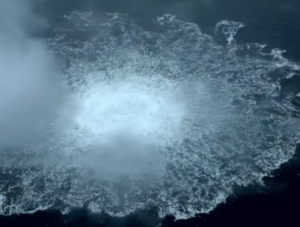 State terrorism versus Nord-Stream | Quelle: Swedish Coast Guard – Screenshot
State terrorism versus Nord-Stream | Quelle: Swedish Coast Guard – Screenshot
Joe Biden’s threats are tantamount to a smoking gun
It was certainly careless of Joe Biden to have threatened that if Russia invaded Ukraine, Nord-Stream would be no more. This was repeated by officials of the State Department. Moreover, the US had already done everything in its power to frustrate the completion of Nord-Stream II, as evidenced by the illegal unilateral coercive measures imposed on businesses throughout the world to intimidate enterprises such the Dutch-Swiss Allseas and a Swiss insurance company with colossal penalties. Such actions were illegal, constituted interference in the internal affairs of states and illegal extra-territorial application of US laws, but the world somehow tolerated them. Still they contribute to the growing legal dossier against the US. Notwithstanding the illegal UCMs, Nord-Stream II was completed and ready to operate since 2021. Then came the massive pressures brought by the US on Germany not to certify it.
Presumption of innocence
Someone in the US falsely invoked the principle “in dubio pro reo” – in doubt for the accused. This principle only applies with regard to persons, but not with regard to governments, who usually hold and control most of the evidence. No country can expect to be cleared of suspicions of having committed an offence simply by stonewalling. The Roman adage “if you did it, deny it” (si fecisti, nega) does not erase the circumstances that clearly point at a given country. The first question that everyone has to ask is who benefits from the act in question. Who benefits from blowing up Nord-Stream? In his defence plaidoyer Pro Milone, Cicero already posed the crucial question “Cui bono?”. Indeed, every court has to come to grips with this question and must give a satisfactory answer. There are many countries that commit crimes and then play innocent. True enough, Israel keeps silent about its terroristic attacks against Syria and Iran, about its targeted assassinations. But everyone knows “Who done it”.
Burden of proof
Circumstantial evidence is used by all domestic and international courts, especially when the “corpus delicti” is not entirely accessible, e.g. when the evidence has been destroyed by the perpetrators, when governments deliberately tamper with the information and erase digital records. The UN Human Rights Committee has ample experience in judging cases where governments stonewall. Already in 1982, the Committee reversed the burden of proof in the case of Bleier v. Uruguay[2]. In that case the Uruguayan military junta denied knowledge about the whereabouts of Eduardo Bleier, who had been arrested by Uruguayan police, held in a prison in Montevideo, where his wife would bring him clothes and food. One day Bleier “disappeared”. By a note of 14 August 1981 to the Human Rights Committee the Uruguayan government contended that: “the Committee displays not only an ignorance of legal rules relating to presumption of guilt, but a lack of ethics in carrying out the tasks entrusted to it, since it so rashly arrived at the serious conclusion that the Uruguayan authorities had put Eduardo Bleier to death.” The Committee responded that: “in accordance with its mandate under article 5 (1) of the Optional Protocol, the Committee has considered the communication in the light of the information made available to it by the authors of the communication and by the State party concerned. In this connection the Committee has adhered strictly to the principle audiatur et altera pars and has given the State party every opportunity to furnish information to refute the evidence presented by the authors.” This is the constant jurisprudence of the Human Rights Committee since 1982. The burden of proof is reversed when the State hold the information and stonewalls.
Rational reasons to deny responsibility
US intelligence services know exactly what happened, who gave the orders, who conducted the terrorist attack. Of course, the US does not want to admit to a major violation of international law constituting a breach of international peace and security for purposes of article 39 of the UN Charter. The US hides behind silence and secrecy. Indeed, secrecy is a facilitator of crime. Negation is another enabler of criminality. The US and its propaganda machine have for decades propagated the myth that the US is a “democracy” and that it is a country under the “rule of law”. Yet, the US lies to the American people, as it did with regard to the invasion of Cuba in 1961, the Vietnam War, the Yugoslav, Afghanistan, Iraq, Libya and Syrian wars. Although the US has been proven to be a serial liar, the corporate/mainstream media does what it can to create a positive image of the United States as the “leader” of the “free world”, the “exceptional” or “indispensable country”, as the late Secretary of State Madeleine Albright used to call her adopted country.
Obligations under the UN Charter
The US has no legal justification to refuse to cooperate in an international investigation. The US is obliged under the UN Charter to cooperate in building a just world order. Already the preamble of the UN Charter obligates the United States “to establish conditions under which justice and respect for the obligations arising from treaties and other sources of international law can be maintained”. Among the treaties[3] that the United States must promote and respect are the Convention for the Suppression of Unlawful acts against the Safety of Maritime Navigation, Rome 1988, which obliges parties to either extradite or prosecute alleged offenders who have committed unlawful acts against ships, such as placing bombs on board ships. This was supplemented by the Protocol for the suppression of unlawful acts against the safety of fixed platforms, which extends the requirements to platforms engaged in the exploitation of oil and gas. The latter protocol can be applied per analogiam. Most importantly we must recall the International Convention for the suppression of terrorist bombings, New York 1997, obligating each State to prosecute or extradite such persons.
The US is not the only country that engages in terrorist activities. Israel has done it for decades in total impunity. France tried to do it in the Rainbow Warrior case[4], where the Greenpeace ship Rainbow Warrior was sunk by French government divers on 10 July 1985. Although some persons were prosecuted, no one in high office was ever disturbed, and France suffered little damage to its positive international image.
Mechanisms for dealing with the Nord-Stream-Case
As the principal international organ dealing with international peace and security, the UN Security Council has the obligation to condemn terrorism, as it did immediately after the 11 September 2001 attack in New York City and Washington D.C., when it adopted resolution 1368 (2001) condemning in the strongest terms the terrorist attack against the United States and calling on all states to work together urgently to bring the perpetrators to justice.
Not untypical for the United Nations, and in particular the Security Council, the resolution on Nord-Stream was rejected. Here again we witness the application of double-standards. The silence of the UN with regard to the terrorist sabotage of Nord-Stream is as deafening as its silence with regard to the 40 US bio-labs in Ukraine. Here again we have to do with massive pressures by the US and NATO upon the Security Council, and by a tradition of primarily serving the interests of the West and not the interests of humanity at large.
This does not mean that there will not be any independent international investigation under the auspices of the United Nations. Fact-finding Missions or Commissions of Inquiry could be established by various UN agencies.
It is now up to the General Assembly to do so. It should be possible to obtain a majority at the General Assembly. Moreover, the General Assembly should go beyond the mere condemnation of the Nord-Stream sabotage. It should adopt a resolution under article 96 of the UN Charter requesting an advisory opinion from the International Court of Justice on the question of the legal consequences of the blowing up of the pipelines, in particular the civil and penal liabilities involved.
Bearing in mind that international terrorism is within the remit of the UN Vienna Office on Drugs and Crime[5], its terrorism prevention Branch must be seized of the matter and conduct its own investigation as soon as possible.
Yet another UN agency that has competence is the United Nations Environmental Programme[6]with headquarters in Nairobi. The UNEP European Office should investigate the adverse ecological impacts of the blasts to fisheries in the Baltic Sea[7].
I would also propose the filing of an inter-State complaint under article 41 of the International Covenant on Civil and Political Rights. All countries that have NOT put a declaration restricting the Committee’s jurisdiction under article 41 could present such a complaint against the US (which never introduced a reservation about the application of article 41, because it felt that no state would ”dare” activate this procedure). I see issues arising under articles 1, 2, 6, 19, 26.
From the Human Rights perspective, surely the UN Human Rights Council should adopt a resolution condemning the Nord-Stream sabotage and could establish a Fact-Finding Mission to investigate the adverse human rights impacts in the region and the world, as indeed, an attack on energy supplies has widespread consequences, especially for the enjoyment of economic and social rights, and for the achievement of the Sustainable Development Goals.
The Special Procedures of the Human Rights Council have various avenues to further investigate the blasts. Surely it is within the remit of three Rapporteurs – the Rapporteur on Terrorism, the Rapporteur on the Right to Truth, Justice and Reparation, and the Rapporteur on Freedom of Opinion and Expression.
There are also violations of the United Nations Convention on the Law of the Sea. And even if the US never ratified the UN Convention on the Law of the Seas, nothing stops the UNCLOS Secretariat from establishing a working group to study the implications of the sabotage of undersea pipelines.
Whistle-blowers
What we most need today is Whistle-blowers in the United States, Norway, Sweden and Germany. They know who done it. We need more human rights defenders like Julian Assange and Edward Snowden, who have shown us what monstrous crimes have been committed in our name. If we aspire to call ourselves “democrats”, we must first and foremost defend the right to know, the right to truth. We must demand transparency and accountability and denounce secrecy as the mother of national and international criminality. The credibility of the United Nations – and more generally of international law – is at stake.
Notes
[1] https://seymourhersh.substack.com/p/how-america-took-out-the-nord-stream
[2] http://www.worldcourts.com/hrc/eng/decisions/1982.0″3.29_Bleier_Lewenhoff_v_Uruguay.htm. See Jakob Moller/Alfred de Zayas, United Nations Human Rights Committee Caselaw, N. P. Engel 2009, pp. 148 et seq.
[3] https://www.ohchr.org/en/press-releases/2009/10/united-nations-treaties-against-international-terrorism
[4] https://www.greenpeace.org/international/explore/ships/rainbow-warrior/
[5] https://www.unodc.org/unodc/en/terrorism/
[6] https://www.unep.org/
[7] https://www.unep.org/regions/europe

Alfred de Zayas is a professor of law at the Geneva School of Diplomacy and served as a UN Independent Expert on International Order 2012-18. He is the author of ten books including “Building a Just World Order” Clarity Press, 2021.
Note from the Editor: Appendix with details of UN-draft resolution for an UN-Inquiry-Commission to investigate Sabotage of Nord Stream Pipeline:
On 27.3.2023 the UN-Security Council rejected a draft resolution for establishing an International Commission of Inquiry (COI) to Investigate Sabotage of Nord-Stream-Pipeline: Here
The following countries voted for the draft resolution and International Inquiry Commission – COI:
China, Brazil and Russian Federation
The following countries abstained:
France, UK, USA, Albania, Ecuador, Gabon, Ghana, Japan, Malta, Mozambique, Switzerland & United Arab Emirates

